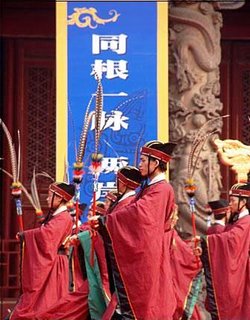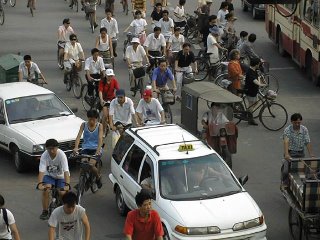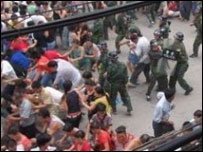
Proceeding at the ritual
Today marks the 2557th birthday of Confucius. Like last year, grand ceremonies were held across China and Taipei, to celebrate the life, ideas and achievements of Confucius. This year’s ceremony stressed the message that mainland China and Taiwan share the same cultural root.
http://news.xinhuanet.com/photo/2006-09/28/content_5147101.htm
China Faces Social Security Fund Management Crisis
Among several implications, the recent sack of Shanghai party chief Chen Liangyu also revealed serious problems of the management and supervision of huge social security fund collected in cities around China.
Mr. Chen allegedly involved in loaning 3.2 billion yuan (US$400 million) of Shanghai social security fund to a company to purchase stocks, which is illegal under current Chinese law. What happened in Shanghai is only one of many incidents of illegal use of social security fund by local governments. This week, a few experts warned in Beijing that China is facing bigger and bigger challenge to manage its fast accumulating social security funds.
As part of comprehensive social reforms in China, more money is being collected for social security fund to match its expanding coverage. Currently, the fund is supposed to cover pension, work injury, job loss, health care and maternity for millions of urban residents participating in social security plans. The policy is yet applied to rural population.
In 2005, the total amount of the fund reached 1,843,500,000,000 yuan (about US$233 billion), three times that in 2000, according to Xinhua. But illegal uses of the fund are also widely seen. Some of the embezzled money was retrieved, but some was no where to be pursued.
Despite central government’s request that pension fund should be managed by professional fund management institutions, many local governments are actually taking the control. They do not make transparent their management of the money, and often use it for high risk investments like stocks, or loan it to businesses having close ties with government officials, regardless the prospect of the investment or the solvency of the borrower.
In the case of Shanghai, pension fund was overseen by a government agency, and large amount of the money was invested in stock market or real estate, which is prohibited by the central government.
As a matter of fact, pension money has fueled the fast growth of Shanghai’s real estate business in the 1990s, but a large portion of the investment failed, Asian Times reported.
How to manage this huge money to increase its value is another thorny problem. China has yet found an efficient solution in that regard, partly due to the lack of a developed and sound capital market system. He Ping, an expert on social security suggests that the government could try to invest the money in high profit industries like electricity and oil.
Poor management and supervision of the fund has already created huge pension deficit, which could trigger social upheaval if the situation was not improved.
http://www.atchinese.com/index.php?option=com_content&task=view&id=22824&Itemid=110
http://news.xinhuanet.com/fortune/2006-09/26/content_5140558.htm
----by Josie Liu




